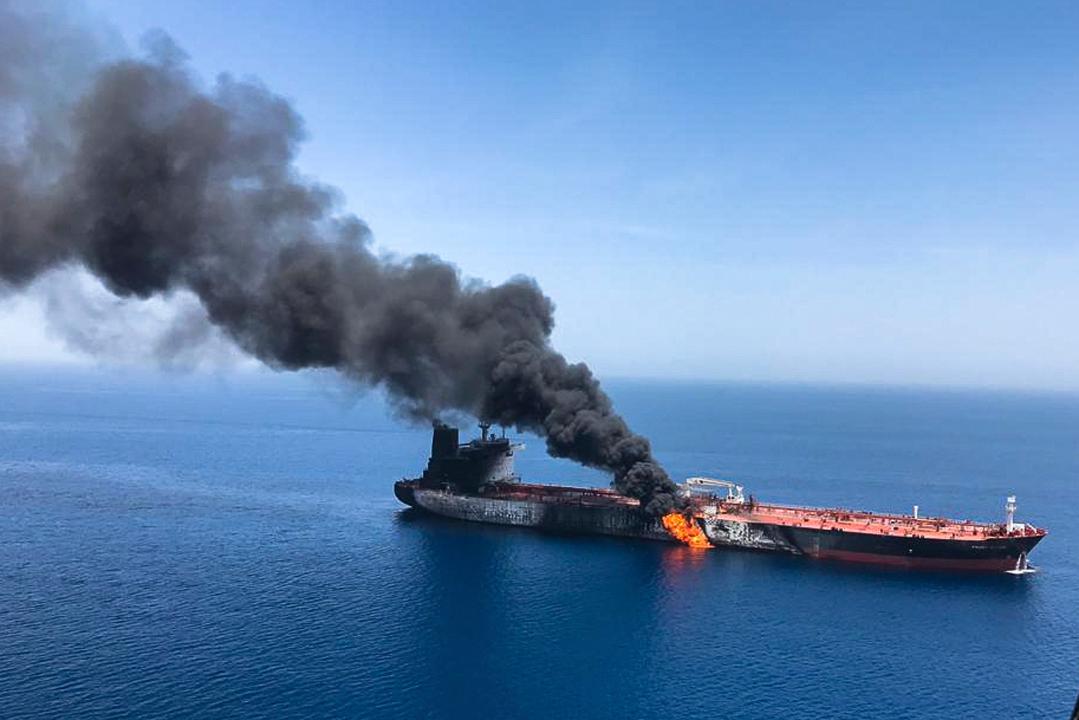US blames Iran for explosions of oil tankers in Strait of Hormuz
The United States has blamed Iran for the attacks on two oil tankers in the Gulf of Oman on Thursday that drove up oil prices and raised concern about the U.S.-Iranian confrontation.
With no diplomatic relations between the two countries, no serious dialogue is underway despite efforts by other countries to mediate.
“While clearly the video that we’ve seen with the border long side removing the excess limpet mine off the ship that didn’t explode, that’s one piece of it, I think we still have much more steps to take because we need to figure out how did they get it there? Who put it on there and why are they engaged in this kind of activity before we really get the international community engaged on this issue,” former Commander of the USS Cole Kirk Lippold said on “Mornings with Maria" Friday.
There is no place in the world more important for the global supply of oil than the Strait of Hormuz. The strait is a key route of the global oil market.
According to the United States Energy Information Administration, separating the United Arab Emirates, Oman and Iran, is 21 miles wide at its narrowest point, but the width of the shipping lane in either direction is only two miles wide.
Persian Gulf oil exporters—Iraq, Kuwait, Saudi Arabia, the United Arab Emirates (UAE), and Qatar—shipped almost 22 million barrels per day of oil and products through the strait in the first half of 2018, which is roughly 20 percent of the global oil market according to EIA.
“Iran is the one creating this problem in an international waterway where clearly a large chuck of the oil goes through there. I’m sure that the analysts over at the office of naval and intelligence are looking at what assets are available in what ports. Who’s moved, who’s out in the Gulf, what ships and boats are out there operating, what are their movements appear to be, what are the vulnerability of the ships, where are these tankers and where have they been and where could the Iranians have possibly gotten that on board,” Commander Lippold.
Hours after the explosions, Secretary of State Mike Pompeo described the incident as a "blatant assault" and said the U.S. had concluded Iran was responsible for targeting the Norwegian-owned and Japanese-owned ships along the vital oil transit route near the strategic Strait of Hormuz.
Pompeo cited intelligence reporting, recent similar incidents and the sophisticated nature of the attacks. Iran has denied being involved, accusing the U.S. instead of waging an “Iranophobic campaign” against it.
While Iran has denied being involved in the attack, Tehran previously used mines against oil tankers in 1987 and 1988 in the “Tanker War,” when U.S. Navy escorted ships through the region.
“Given how Iran runs, how can you have a false flag operation when they have gaged in this type of activity literally for decades. So, if this is going on within Iran, this is clearly because you have mullahs that are interior to Iran that are causing this problem to exist,” Lippold said. “Now, it is building that case where we get the rock-solid proof to show that Iran is behind this so that other nations can begin to apply both economic and diplomatic pressure so that military becomes an option of that last resort if we have to do it.”
How should American government and allies around the world respond?
“It was more of a broadcast signal than anything else. Putting a squad of B-52’s there, putting an aircraft carrier strike group with all the chips there that is merely one foot in the door, Lippold said. “We could not anyway meaningfully engage Iran with just those assets that are there right now. It would take a lot more investment in the region, plus I don’t believe the United States should be doing it alone.”
CLICK HERE TO GET THE FOX BUSINESS APP
Lippold urges the U.S. to provide the international community with a larger landscape of Iran’s actions to garner support.
“What’s happening and the danger Iran’s action that this is a danger because if we do not take action on this as the United States to hold Iran accountable for what is going on in the international waterway, what signal might that be sending to China when it comes to the South China Sea and the militarization of that area?,” he said. “This is an international waterway, people have a right of innocent passage to transit through there. We need to keep the flow of oil going for the world’s economies.”




















